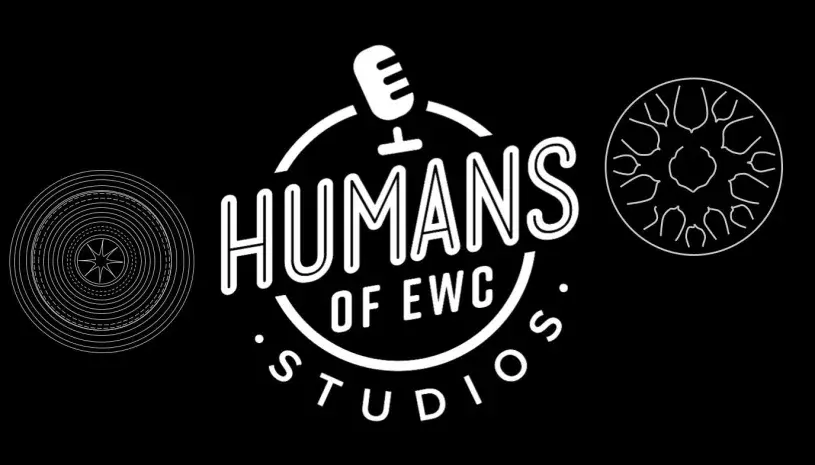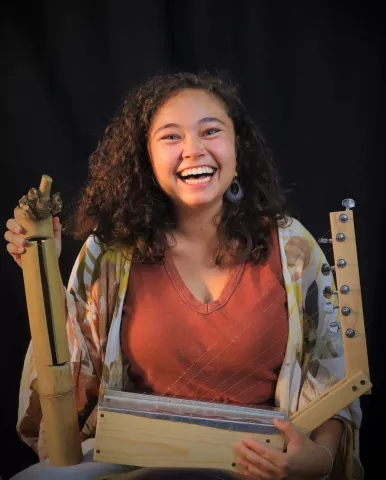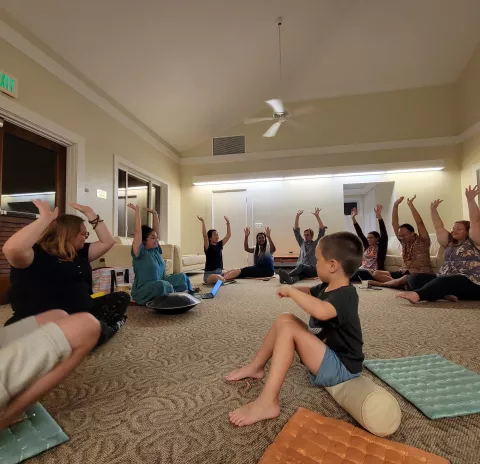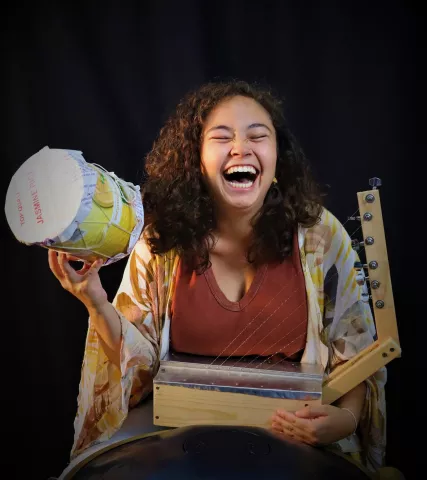Error message
Humans of EWC Studios offers a window into our community for those interested in learning about EWC through a more personal lens. The feature below includes extended materials from our Humans interview with playwright, storyteller, and EWC Foundation Scholarship awardee Karese Kaw-uh, who is pursuing her MFA in Theatre for Young Audiences.
"If you Teach a Man to Fish"
If you give a man a fish,
he'll have food for a day.
If you give a man a fish,
he'll have food for a day.
For a day he'll have food,
his belly will be full,
but only one day,
that's how far it goes.
So, if you teach a man to fish,
he'll have food for a longer time.
If you teach a man to fish,
he'll have food for a longer time.
For a long time he'll have food,
his belly will be full,
for more than one day,
but there's more for me to say...
So, if you teach a man to care
for the rivers and streams,
If you teach a man to care
for the rivers and streams,
then the waters will be fresh,
and there'll be lots of fish,
for more than one lifetime.
As generations pass,
the supplies will always last,
for more than one lifetime.
So you should care for the rivers,
and the forest, and trees.
We should work together to care
for the land and the seas.
'Cause the earth is our home.
That's where we belong,
and it is our lifeline.
Yes, the earth is our home.
That's where we belong.
So we need to care for our world,
yes, take care of our home,
that allows us to be free.
You see, when we care for our earth,
it will grow healthy and strong.
We won't have to worry
about what to eat or if we have enough,
because it will all fall into place.
You're listening to a Humans of East-West Center Studio feature. We're here today with Karese. Karese, can you introduce yourself please?
Hello! My name is Karese Kaw-uh. I am a second year MFA student in Theatre for Young Audiences. I am a foundation scholar with East-West Center. And I've hosted a couple of art events. I've done paint nights to just kind of help students relax and get their minds off of a tough semester.
I kind of am from all over the place because I grew up in a military family. So I've lived in seven different states and two different countries. I'm also bi-racial, so I'm Thai, Dutch-American, which has played a big role in me actually coming to Hawaiʻi, looking more for Asian theatre and community development.
Thanks Karese. I'm wondering...how has being a part of this community affected and informed your studies at UH?
Good question. So my first year here, my kitchen buddy is from Thailand. And we just became really good friends. And she encouraged me to take a class my second semester, MUS 311 (it's really good. You should take it!) and we learned all about the music of Thailand, but particularly we learned more about the northern part of Thailand, and the Pgaz k'nyau [Karen], so that's actually, I was so inspired that class that I decided to take my research further.* And I was inspired by the storytelling of the community. So my thesis is actually adapting their story into a play for young audiences.
So it kind of ties in with my most memorable experience. Like, the people that I met, I wouldn't have joined the class and I wouldn't have learned about this community, the Pgaz k'nyau, if it weren't for my friend from Thailand who was like, "hey! You should take this music class. We can take it together." And, kind of from there it grew. So, little things happen, they keep happening, and you never know where it takes you.
Awesome. Thank you so much. So the song you're sharing with us today is from this play that you're working on, right? Can you tell us more about it?
So this song is called "If you teach a man to fish", and it's based on a philosophy, a Pgaz k'nyau philosophy. Maybe you've heard of "if you give a man a fish, he'll have food for a day. But if you teach a man to fish, he'll have food for a lifetime." But the Pgaz k'nyau take this philosophy a step further, and they say that if you teach a man to care for the rivers and streams, and for the forest and the trees, and nature...if you care for the environment, then you will have food for generations to come. And so I just love this idea of sustainability. Yeah! So this song is inspired by that story.
*Karese studied Pgaz k'nyau music with visiting EWC Artists-in-Residence Khuewa and "Chi" Suwichan Phatthanaphraiwan in April of 2022. More information about their month-long residency at EWC can be found here.
Humans of EWC Studios offers a window into our community for those interested in learning about EWC through a more personal lens. The feature below includes extended materials from our Humans interview with playwright, storyteller, and EWC Foundation Scholarship awardee Karese Kaw-uh, who is pursuing her MFA in Theatre for Young Audiences.
"If you Teach a Man to Fish"
If you give a man a fish,
he'll have food for a day.
If you give a man a fish,
he'll have food for a day.
For a day he'll have food,
his belly will be full,
but only one day,
that's how far it goes.
So, if you teach a man to fish,
he'll have food for a longer time.
If you teach a man to fish,
he'll have food for a longer time.
For a long time he'll have food,
his belly will be full,
for more than one day,
but there's more for me to say...
So, if you teach a man to care
for the rivers and streams,
If you teach a man to care
for the rivers and streams,
then the waters will be fresh,
and there'll be lots of fish,
for more than one lifetime.
As generations pass,
the supplies will always last,
for more than one lifetime.
So you should care for the rivers,
and the forest, and trees.
We should work together to care
for the land and the seas.
'Cause the earth is our home.
That's where we belong,
and it is our lifeline.
Yes, the earth is our home.
That's where we belong.
So we need to care for our world,
yes, take care of our home,
that allows us to be free.
You see, when we care for our earth,
it will grow healthy and strong.
We won't have to worry
about what to eat or if we have enough,
because it will all fall into place.
You're listening to a Humans of East-West Center Studio feature. We're here today with Karese. Karese, can you introduce yourself please?
Hello! My name is Karese Kaw-uh. I am a second year MFA student in Theatre for Young Audiences. I am a foundation scholar with East-West Center. And I've hosted a couple of art events. I've done paint nights to just kind of help students relax and get their minds off of a tough semester.
I kind of am from all over the place because I grew up in a military family. So I've lived in seven different states and two different countries. I'm also bi-racial, so I'm Thai, Dutch-American, which has played a big role in me actually coming to Hawaiʻi, looking more for Asian theatre and community development.
Thanks Karese. I'm wondering...how has being a part of this community affected and informed your studies at UH?
Good question. So my first year here, my kitchen buddy is from Thailand. And we just became really good friends. And she encouraged me to take a class my second semester, MUS 311 (it's really good. You should take it!) and we learned all about the music of Thailand, but particularly we learned more about the northern part of Thailand, and the Pgaz k'nyau [Karen], so that's actually, I was so inspired that class that I decided to take my research further.* And I was inspired by the storytelling of the community. So my thesis is actually adapting their story into a play for young audiences.
So it kind of ties in with my most memorable experience. Like, the people that I met, I wouldn't have joined the class and I wouldn't have learned about this community, the Pgaz k'nyau, if it weren't for my friend from Thailand who was like, "hey! You should take this music class. We can take it together." And, kind of from there it grew. So, little things happen, they keep happening, and you never know where it takes you.
Awesome. Thank you so much. So the song you're sharing with us today is from this play that you're working on, right? Can you tell us more about it?
So this song is called "If you teach a man to fish", and it's based on a philosophy, a Pgaz k'nyau philosophy. Maybe you've heard of "if you give a man a fish, he'll have food for a day. But if you teach a man to fish, he'll have food for a lifetime." But the Pgaz k'nyau take this philosophy a step further, and they say that if you teach a man to care for the rivers and streams, and for the forest and the trees, and nature...if you care for the environment, then you will have food for generations to come. And so I just love this idea of sustainability. Yeah! So this song is inspired by that story.
*Karese studied Pgaz k'nyau music with visiting EWC Artists-in-Residence Khuewa and "Chi" Suwichan Phatthanaphraiwan in April of 2022. More information about their month-long residency at EWC can be found here.





